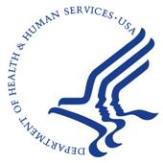Emergency Request Memo [23DEC2024]
Emergency Request Memo_23DEC2024.docx
[NCEZID] The National Healthcare Safety Network (NHSN)
Emergency Request Memo [23DEC2024]
OMB: 0920-0666
DEPARTMENT
OF
HEALTH
&
HUMAN
SERVICES
Public
Health
Service
Centers
for
Disease
Control
and Prevention (CDC) Atlanta
GA
30341-3724




December 20, 2024
Dominic Mancini Deputy Director
Office of Information and Regulatory Affairs Office of Management and Budget Washington, DC
Subject: Request for Emergency Review and Clearance Dear Mr. Mancini:
Pursuant to Office of Management and Budget (OMB) procedures established at 5 CFR Part 1320, Controlling Paperwork Burdens on the Public, I request that the proposed information collection project, “Pathogens of High Consequence Form” be processed in accordance with section 1320.13, Emergency Processing.
The National Healthcare Safety Network (NHSN) is requesting to add three diseases to the Infectious Diseases of Public Health Concern form: Influenza A (H5), Marburg, and Oropouche. I have determined that this information must be collected prior to the expiration of time periods established under Part 1320, and that this information is essential in the continued and uninterrupted operation of the Centers for Disease Control and Prevention (CDC) National Healthcare Safety Network (NHSN).
CDC’s Office of Readiness and Response (ORR) helps the nation prepare and respond to public health emergencies and threats and is monitoring many active CDC responses across the globe. Therefore, it is crucial for CDC to be aware of cases of these select infectious diseases of public health concern to ensure that local and state authorities are equipped to contain potential outbreaks, care for patients, and prevent further spread. The collection of this data is tied to Division of Healthcare Quality and Promotion’s (DHQP) Surveillance Branch (SB) objectives, including creating new surveillance measures to support preparedness, emergency response, and resilience in healthcare systems, as well as growing CDC
leadership in the nation’s evolving healthcare and public health informatics infrastructure.
Acute care hospitals in the United States enrolled in the NHSN Patient Safety Component will have the option to submit incidence and prevalence data on select high consequence pathogens of public health concern through the Infectious Diseases of Public Health Concern form. This form currently collects data on the following diseases: Crimean-Congo Hemorrhagic Fever (CCHF), Dengue, Ebola, Lassa, Measles, Mpox, MERS-CoV, Nipah, and Toxigenic Vibrio cholerae. NHSN is now requesting emergency approval to add three diseases to the data collection: Influenza A (H5), Marburg,
and Oropouche.
Influenza A, particularly the recent outbreak of Influenza A virus subtype H5N1 (avian flu) is widespread in wild birds worldwide and is causing outbreaks in poultry and U.S. dairy cows with several recent human cases in U.S. dairy and poultry workers. More generally, influenza A viruses have pandemic potential given the propensity for genetic mutations between strains, leading to increased risk of
transmission between animals and humans (zoonotic events). While the current public health risk is low, CDC must monitor animal exposures. As human cases of influenza A H5N1 continue to be detected and avian flu is a pathogen of public health concern, it is now being added to the collection to ensure NHSN is capturing all active responses to pathogens of concern.
Marburg and Oropouche were recently added to the list of active responses due to international outbreaks, which began this Fall. This requested update in disease surveillance will illustrate which patient populations are being affected by these pathogens and the potential need for additional healthcare infection prevention and control. Since this form is collecting data on hospitalized patients, the update will also help inform on the severity of illness a high consequence pathogen is causing as well as what region(s) of the country are affected. Data collection is vital to ensure that local and state authorities are supported to prepare for and respond to emerging outbreaks.
The collection instrument itself, 57.130: Pathogens of High Consequence Form, has already undergone public comment. However, these three diseases were not included in the response options. CDC is preparing a 60-day Federal Register Notice to allow the public to comment on this information collection project on the inclusion of these infectious diseases. CDC NHSN cannot reasonably comply with the normal clearance process as it is crucial for CDC to be aware of cases of these select infectious diseases of public health concern to help ensure that local and state authorities are equipped to contain and prevent further spread.
Approval is requested for six months, and as collection will begin March 2025, we are requesting an expiration date of September 30, 2025. Please provide an approval/disapproval determination of this request to collect information under an emergency clearance by close of business 12/31/2024.
Respectfully,

Daniel B. Jernigan, MD MPH
Director, National Center for Emerging and Zoonotic Infectious Diseases Centers for Disease Control and Prevention
| File Type | application/vnd.openxmlformats-officedocument.wordprocessingml.document |
| Author | Samuel, Lee (CDC/OID/NCEZID) |
| File Modified | 0000-00-00 |
| File Created | 2024-12-24 |
© 2026 OMB.report | Privacy Policy